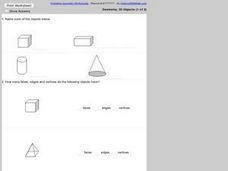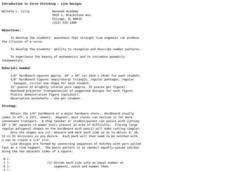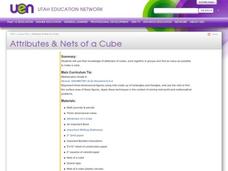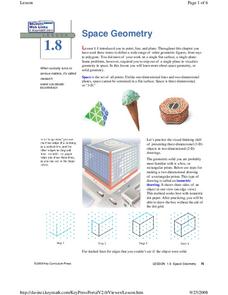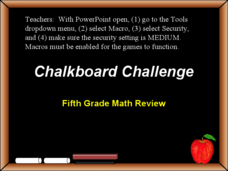Curated OER
Tetrahedron Kites
Let's go fly a kite! Discuss the concept of two-dimensional and three-dimensional objects with your math class. They examine a triangle and discuss the face, vertices, edges, and angles. Then they build their own Tetrahedral Kites and...
Curated OER
Polygons
Fourth graders identify and describe lines, shapes, and solids using formal geometric language. They use Inspiration to create a graphic organizer and outline of polygons.
Curated OER
Geometry: 3D Objects
In this math worksheet, learners examine 4 pictures of 3D objects and write the name of each. Students then study 3 pictures and figure the number of faces, edges and vertices on each.
Curated OER
Volume and Surface Area: Which Is More?
Students explore the volume and surface area of three dimensional figures. Through the use of video, students discover three dimensional shapes, their uses in real-life applications, and methods used to calculate their volume and surface...
Curated OER
Introduction to Curve Stitching - Line Designs
Students develop their awareness that straight line segments can produce the illusion of a curve and helps them recognize and describe number patterns and geometric fundamentals.
Curated OER
Perfectly Puzzling Pentominoes
Second graders utilize manipulatives (pentominoes) to demonstrate knowledge of: lines of symmetry, slides, reflections (flips), rotations (turns), area, and perimeter. This lesson gives students a meaningful way to practice these...
Curated OER
Attributes & Nets of a Cube
Third graders engage in a lesson that focuses on the attributes and forming of a cube. They construct a cube using different combinations while comparing a square with only two-dimensions. Students fold paper while following the...
Pennsylvania Department of Education
Making Cubes
Third graders explore vocabulary associated with three dimensional figures. In this transformations activity, 3rd graders create two dimensional nets for three dimensional figures. Students become familiar with describing two and three...
Curated OER
Grade 5: Testing for Tessellations
Fifth graders use formal geometric language to describe polygons (and other shapes) that will tessellate the plane and those that will not. Students make generalizations about the characteristics of a polygon (or other shape) that will...
Curated OER
Classifying Polygons
Seventh graders participate in a polygon hunt. For this polygon lesson, 7th graders examine how polygons are alike and different. Students create a Venn diagram and label the sorting circles. Students work in cooperative groups to...
Curated OER
Space Geometry
Learners explore points, lines and planes as it relates to geometry. In this geometry activity, students analyze space and explain wy it is 3-D and not flat or 2-D. They solve problems involving volume and 3-D shapes.
Curated OER
Bubbles: Science or Fun?
Students learn through bubbles. In this science lesson plan, students test the effect of four differently shape wands and three geometric figures in a bubble mixture.
Curated OER
A World of Symmetry
Students identify lines of symmetry. In this symmetry instructional activity, students create objects and identify their lines of symmetry. They answer questions about lines of symmetry. Students cut shapes out of cookie dough and...
Curated OER
Surface Area of a Leaf (Grades 7-9)
In this math and science activity, students read about the process of photosynthesis and plant growth. They determine how a plant's ability to create food is dependent on the surface area of its leaves using geometric calculations. They...
Curated OER
The Area of a Circle
Eighth graders find the circumference and diameter of several lids, show the relationship of the two measurements and derive the formula for finding the area of a circle. In this area of a circle lesson plan, 8th graders find...
Curated OER
Water Treatment Plant Tour
Students define vocabulary related to geometry and calculate the volume. In this geometry lesson, students calculate flow rates, and volume as it relates to a water plant facility. They calculate the volume of three dimensional shapes...
Curated OER
Investigating Area Using Tangrams
Tenth graders connect the history of geometry to problem solving. In this geometry lesson, 10th graders investigate polygons through hands on manipulatives and solve problems relating to parallelograms and triangles. They calculate the...
Curated OER
New Boxes From Old
Students find the volume and surface area of a rectangular box (e.g., a cereal box), and then figure out how to convert that box into a new, cubical box having the same volume as the original. As they construct the new, cube-shaped box...
Curated OER
Chalkboard Challenge: Fifth Grade Math Review
This PowerPoint addresses fifth grade math concepts, focusing mostly on geometry. The interactive math review game is in a "Jeopardy" style format and enables students to revisit the topics in geometry such as polygons, quadrilaterals...
Curated OER
Tessellations
Students identify and construct figures that tessellate. They investigate which regular polygons tessellate and how to modify them to make other tessellating figures. Students explore how naturally occurring tessellations have been...
Pennsylvania Department of Education
Length and Perimeter
Third graders explore tessellations and the spatial concepts used in creating them. For this tessellations lesson, 3rd graders rotate, reflect and transform shapes to create tessellations. Students become familiar with the vocabulary...
Curated OER
Geometry Center Games
First graders explore eight geometry activities that improve understanding of positional words and shapes. They identify, describe, and create simple geometric figures. They help another student who may not understand the concept yet.
Curated OER
Half Math
In this beginning fractions worksheet, students solve four problems in which the same geometric figure is divided in half two different ways.
Curated OER
Volume of Spheres
Students find the volume of spheres. In this geometry lesson, students measure and derive the formula for each shape and solid. They use the correct terminology and units when solving these problems.




